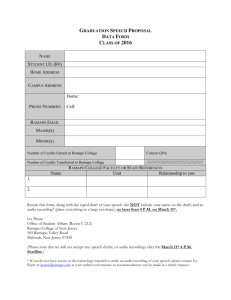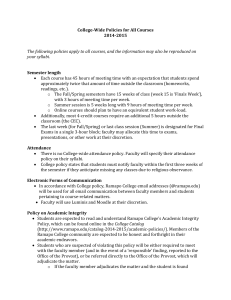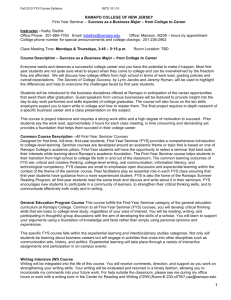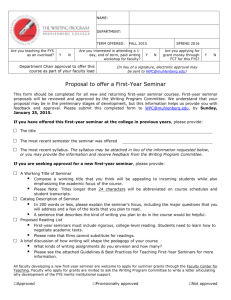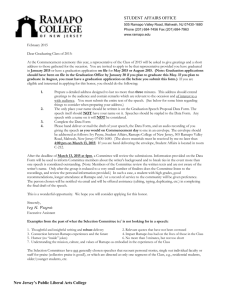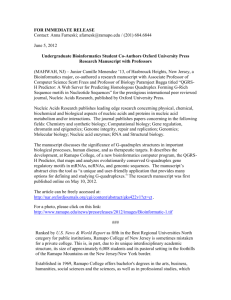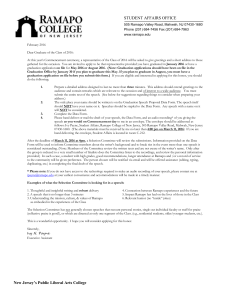RAMAPO COLLEGE OF NEW JERSEY First
advertisement
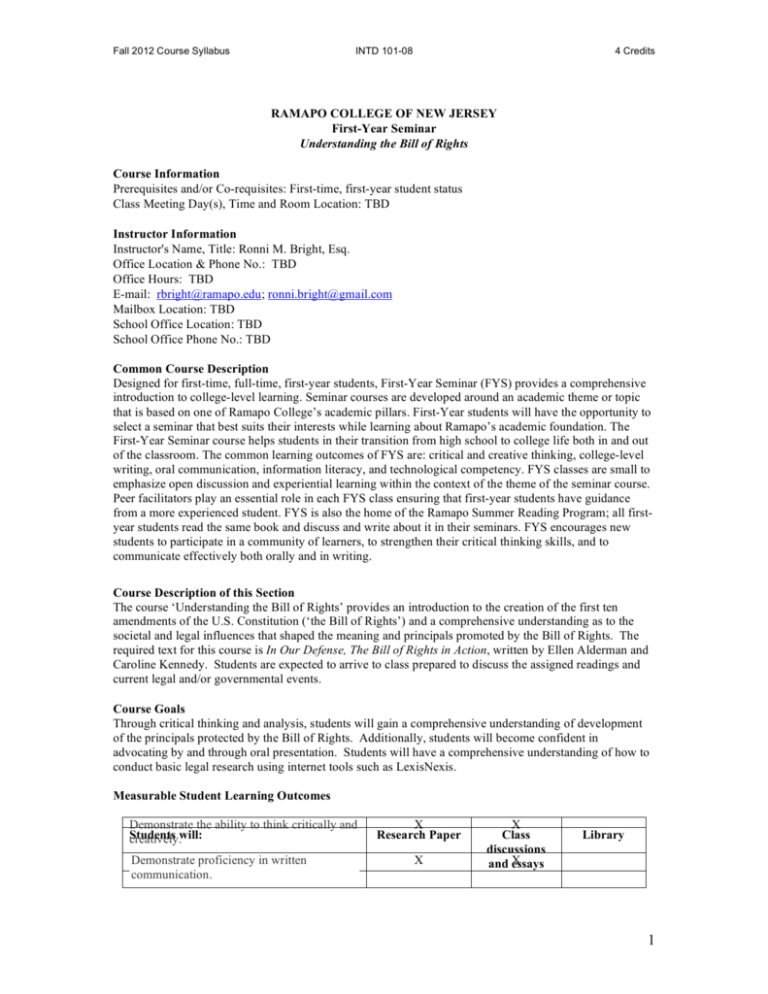
Fall 2012 Course Syllabus INTD 101-08 4 Credits RAMAPO COLLEGE OF NEW JERSEY First-Year Seminar Understanding the Bill of Rights Course Information Prerequisites and/or Co-requisites: First-time, first-year student status Class Meeting Day(s), Time and Room Location: TBD Instructor Information Instructor's Name, Title: Ronni M. Bright, Esq. Office Location & Phone No.: TBD Office Hours: TBD E-mail: rbright@ramapo.edu; ronni.bright@gmail.com Mailbox Location: TBD School Office Location: TBD School Office Phone No.: TBD Common Course Description Designed for first-time, full-time, first-year students, First-Year Seminar (FYS) provides a comprehensive introduction to college-level learning. Seminar courses are developed around an academic theme or topic that is based on one of Ramapo College’s academic pillars. First-Year students will have the opportunity to select a seminar that best suits their interests while learning about Ramapo’s academic foundation. The First-Year Seminar course helps students in their transition from high school to college life both in and out of the classroom. The common learning outcomes of FYS are: critical and creative thinking, college-level writing, oral communication, information literacy, and technological competency. FYS classes are small to emphasize open discussion and experiential learning within the context of the theme of the seminar course. Peer facilitators play an essential role in each FYS class ensuring that first-year students have guidance from a more experienced student. FYS is also the home of the Ramapo Summer Reading Program; all firstyear students read the same book and discuss and write about it in their seminars. FYS encourages new students to participate in a community of learners, to strengthen their critical thinking skills, and to communicate effectively both orally and in writing. Course Description of this Section The course ‘Understanding the Bill of Rights’ provides an introduction to the creation of the first ten amendments of the U.S. Constitution (‘the Bill of Rights’) and a comprehensive understanding as to the societal and legal influences that shaped the meaning and principals promoted by the Bill of Rights. The required text for this course is In Our Defense, The Bill of Rights in Action, written by Ellen Alderman and Caroline Kennedy. Students are expected to arrive to class prepared to discuss the assigned readings and current legal and/or governmental events. Course Goals Through critical thinking and analysis, students will gain a comprehensive understanding of development of the principals protected by the Bill of Rights. Additionally, students will become confident in advocating by and through oral presentation. Students will have a comprehensive understanding of how to conduct basic legal research using internet tools such as LexisNexis. Measurable Student Learning Outcomes Demonstrate the ability to think critically and Students creatively.will: Demonstrate proficiency in written communication. X Research Paper X X Class discussions and X essays Library 1 Fall 2012 Course Syllabus INTD 101-08 4 Credits Demonstrate proficiency in oral communication. X Demonstrate information literacy and technological competency. X X Demonstrate the ability to conduct legal research and analysis. X X Demonstrate the ability to advocate by oral presentation. Demonstrate an understanding of the development of the Bill of Rights. X X X Peer Facilitators As an added resource for first-year students, each section of First-Year Seminar (FYS) will have a peer facilitator. These upper-level students will attend FYS classes and assist the instructor with the academic topics covered in this seminar. They will serve as discussion leaders on issues that pertain to your personal and social development and they will facilitate weekly discussions on the class readings. Your peer facilitator will be your mentor and will be available to you to provide guidance on navigating the different personal and social hurdles that you may encounter in your first year at Ramapo. First-Year Academic Advising Each First-Year Seminar course is assigned a professional Academic Advisor from the Center for Academic Advising and First-Year Experience (CAAFYE) who serves as your Academic Advisor during your first year. This advisor will attend your First-Year Seminar class for a group advisement session to review general academic advising policies and procedures. They will also be available to answer any general questions regarding college policies/practices. Students are encouraged to schedule individual appointments with their CAAFYE Advisor for assistance with course selection and the development of a personal academic plan. If you have any questions regarding Academic Advisement please call CAAFYE at (201) 684-7441 or via email at: caafye@ramapo.edu Texts, Readings, Materials Ellen Alderman and Caroline Kennedy. In Our Defense, The Bill of Rights in Action. First Avon Books Edition, 1992. Print. ISBN 0-380-71720-4 (pbk.) New York Times Hacker, Diana, and Nancy Sommers. Rules for Writers (7th ed.). Boston: Bedford/St. Martin's, 2012. Print. ISBN-13: 978-0-312-64795-7. Benjamin Nugent. American Nerd: The Story of My People. Scribner, June 2, 2009. Print. ISBN139780743288026; ISBN-100743288025 Course Requirements: Classroom Participation – Students are expected to participate in class discussions on the assigned readings and current legal and/or governmental events. Students will be required to make an oral presentation correlating the assigned reading to a current event of their choice. Writing Assignments – Students will be expected to prepare: 2 Fall 2012 Course Syllabus INTD 101-08 4 Credits After the first week of class, students will be assigned for completion a 1-2 page essay discussing the American Nerd: The Story of My People, post first week class discussion. Students are expected to compare and contrast their thoughts and feelings about the summer reader as they existed prior to the class discussion and as they existed after the class discussion. Students should be mindful to use proper punctuation and grammar. After the convocation and address by Benjamin Nugent, students will be assigned for completion a 2-3 page essay discussing the summer reader post convocation. In the essay, students must identify how society has come to define a ‘nerd’ and use their critical thinking skills to express why or not societal and/or cultural influences that have shaped the meaning of ‘the American Nerd’ are positive and/or negative. Students are expected to provide detailed analysis and to use American Nerd: The Story of My People to support their analysis. Students are expected to follow the APA citation format. As a part of the Course Enrichment Component of FYU, students will be assigned for completion a 3-5 page essay in which they must explain the legislative process of how a Bill becomes law and use their creative thinking skills to create a proposed Bill. Students will be expected to use case law and/or the Constitution to support their proposed Bill. Students are expected to use legal citation format using case law and/or the Constitution to support their proposed Bill. Those students who wish to earn extra credit may identify and contact their local congress woman and/or man and inquire of the congress man and/woman their thoughts on the ideals promoted by the student’s proposed Bill. Those students who wish to gain extra credit should speak with the Professor first and will be expected to share with the class the outcome of their contact with their local congress man and/or woman. Students will be required to complete a final paper outline and 1-2 page summary of their selected thesis. The outline should identify the introduction, body and conclusion of the student’s final paper. Students will be required to complete the bibliography page of their final. Prior to this assignment the class will discuss the meaning and purpose of the bibliography page and have the opportunity to utilize the library for additional assistance. Students will be required to complete a final paper (7-10 pages). A list of preselected topics will be provided to students. Students may select one of the provided topics or they may submit a topic of their choosing for approval. Students will be required to use APA format when citing to literature. Students will be required to use case law and the Bill of Rights to support their thesis. All reference to case law and the Bill of Rights must include proper legal citation. Examinations, Laboratory/Studio, Library Research – Students will be required to go to the Library and receive training on legal research using LexisNexis. Students will be required to go to the Library identify and select the written materials they will use to support the thesis of their final paper. Students must make create the bibliography page for their final paper after having selected said written materials. The bibliography must be prepared using APA format. Course Enrichment Component – Each course will include a minimum of five (5) hours of unmonitored appropriate experience outside of the classroom. For this component of FYS, students are required to schedule a visit to the New Jersey State House. A class trip will be 3 Fall 2012 Course Syllabus INTD 101-08 4 Credits scheduled, however, if students are unable to attend the scheduled class trip they will have to make arrangements to visit the New Jersey State House on their own time. The class trip to the State House will expose students to the workings of New Jersey’s state government and how bills become laws in the state of New Jersey. This experience will enhance students understanding of how proposed legislation becomes law within our society and more specifically in the state of New Jersey. Students will be assigned for completion a 3-5 page essay in which they must explain the legislative process of how a Bill becomes law and use their creative thinking skills to create a proposed Bill. Students will be expected to use case law and/or the Constitution to support their proposed Bill. Students are expected to use legal citation format using case law and/or the Constitution to support their proposed Bill. General Education Program Course This course fulfills the First-Year Seminar category of the general education curriculum at Ramapo College. Common to all First-Year Seminar (FYS) courses, you will develop critical thinking skills that are basic to college level study, regardless of your area of interest. You will be reading, writing, and participating in thoughtful group discussions with the aim of developing the skills of a scholar. You will learn to support your arguments using a foundation of knowledge and facts rather than simply using personal opinions and experiences. The course ‘Understanding the Bill of Rights’ fulfills the experiential learning component of the FYS categories. Students will gain a comprehensive understanding of the Bill of Rights and experience the legislative process through the required trip the New Jersey State House. Writing Intensive (WI) Course Writing will be integrated into the life of this course. You will receive comments, direction, and support as you work on strengthening your writing skills. Your writing will be evaluated and returned in a timely fashion, allowing you to incorporate my comments into your future work. For help outside the classroom, please see me during my office hours and/or work with a writing tutor in the Center for Reading and Writing (CRW), Room: E-230, x7557, cas@ramapo.edu. Weekly Class Schedule For each class meeting, indicate date, topic and required readings and assignments. Indicate due dates for papers, assignments, quizzes, and exams where possible. With as much detail as possible, a syllabus will provide students with a sense of the course's structure and sequence so that they can perceive a relationship between the goals of the course and the topics of materials to be covered. The calendar should include notice of when exams are to be given, or are due, or conferences to be held. The calendar should also include important deadlines such as add/drop, withdrawal, and incomplete requests. The ARC reminds faculty that tests/quizzes may not be is updated prior to the start of semester to show the Final Exam schedule for the upcoming semester. Week 1 Topic of class discussion: American Nerd: The Story of My People. Research Topics In Our Defense. The Bill of Rights in Action. Reading Assignment: In Our Defense. The Bill of Rights in Action.; Pgs. 13-54. New York Times. Select and read an article from the ‘Politics’ and/or ‘Technology’ section of the New York Times. Be prepared to discuss the impact 1) freedom of speech and 2) freedom of press has had on the topic of your selected article. 4 Fall 2012 Course Syllabus Written Assignment: INTD 101-08 4 Credits Write a 1-2 page paper. Discuss how Benjamin Nugent defines the evolution of the term ‘Nerd’. Discuss how reading American Nerd: The Story of My People has impacted your understanding of the meaning of the term ‘Nerd’ as used in American culture and society. This assignment must be handed in at the next class meeting. Week 2 Topic of class discussion: Freedom of Speech Missouri Knights of the Ku Klux Klan v. Kansas City Freedom of Press: United States v. The Progressive Current Events: Class discussion on the student selected New York Times article(s) and their relation to ‘Freedom of Speech’ and ‘Freedom of Press’. Oral presentations: Students will be selected to present the positions taken by the plaintiff and/or defendants in Missouri Knights of the Ku Klux Klan v. Kansas City and/or United States v. The Progressive. A brief class discussion will be held after the student presentations. Reading Assignment: In Our Defense. The Bill of Rights in Action; Pgs. 59-88. New York Times. Select and read an article from the ‘World’ section of the New York Times. Be prepared to the affect the selected reading has on American society. Written Assignment: Prepare a 1 page paper discussing the importance of 1) Freedom of Speech or 2) Freedom of Press. Be mindful of proper grammar and punctuation. This assignment must be handed in at the next class meeting. September 21st, 2011 1:00 – 2:30 PM Week 3 Topic of class discussion: Convocation Benjamin Nugent APA Format Freedom of Religion Lyng v. Northwest Indian Cemetery Freedom of Assembly Hobson v. Wilson Current Events: Class discussion on the student selected New York Times article(s) and their relation to ‘Freedom of Religion’ and/or ‘Freedom of Assembly’. Oral presentations: Students will be selected to present the positions taken by the plaintiff and/or defendants in Lyng v. Northwest Indian Cemetery and/or 5 Fall 2012 Course Syllabus INTD 101-08 4 Credits Hobson v. Wilson. A brief class discussion will be held after the student presentations. Reading Assignment: In Our Defense. The Bill of Rights in Action; Pgs. 91-111. New York Times. Select and read any article from the New York Times. Be prepared to discuss your thoughts on the selected article. Written Assignment: Prepare a 2-3 page paper discussing how society has come to define a ‘nerd’ and express why or not societal and/or cultural influences that have shaped the meaning of ‘the American Nerd’ are positive and/or negative. Use American Nerd: The Story of My People to support your analysis and cite same using the APA format. This assignment must be handed in at the next class meeting. Week 4 Library Research Workshop: Introduction to library resources including useful library databases, book and journal holdings. Additionally students will be introduced to web-based resources including LexisNexis (web based legal research tool). After the workshop students are to research their selected research topic and to identify those resources which will be used to support the thesis of the student’s selected research topic. Students will not be assigned reading as a means of allowing them to use their time to complete thorough research on their research topics. Students should come to the week 5 class with a 1 page summary of their thesis and an outline for the final paper. Week 5 Topic of class discussion: The Right to Keep and Bear Arms: Quilici v. Morton Grove Current Events: Selected student presentations on the student selected New York Times article(s). Research Topic: Discuss research, outlines, and bibliography pages. This is an opportunity for students to raise any concerns they have with respect to the Final paper. Reading Assignment: In Our Defense. The Bill of Rights in Action; Pgs. 115-144. Research Assignment: Students must find a partner and together use LexisNexis to research New Jersey case law and find an opinion on that discusses the Fourth Amendment. Students should be prepared for the week 6 class, to represent the positions of the prosecution and defense in their selected case law. Week 6 Class 6 Fall 2012 Course Syllabus INTD 101-08 4 Credits Topic of class discussion: Unreasonable Search and Seizure: McSurely v. McClellan Class presentations: Student partners will represent the positions of plaintiff/prosecutor and defense in their selected case. Legal citation format Reading Assignment: In Our Defense. The Bill of Rights in Action; Pgs. 147-165. Written Assignment: Prepare a 2-3 page memorandum discussing the case law you presented to the class. The memorandum should make the reader aware of what the issue was before the Court and include the position taken by the prosecutor and defense with respect to said issue; the conclusion of the opinion rendered by the Court and the Court’s reasoning for its conclusion. Students must cite to the case law and use proper legal citation format. This assignment must be handed in at the next class meeting. Week 7 Academic Advisement Session: Assigned Reading: A member of the Center for Academic Advisement will make a presentation to class that is designed to aide students in selecting courses for their spring semester. In Our Defense. The Bill of Rights in Action; Pgs. 167-188. Week 8 Topic of class discussion: Right Against Self Incrimination Baltimore City Department of Social Services v. Bouknight Due Process of Law: Fuentes v. Shevin Class presentations: Students will be selected to present the positions taken by either the plaintiff and/or defendants in Baltimore City Department of Social Services v. Bouknight and/or Fuentes v. Shevin. A brief class discussion will be held after the student presentations. Final paper: discussion on Bibliography page. Reading Assignment: In Our Defense. The Bill of Rights in Action; Pgs. 189-205. Written Assignment: Prepare the Bibliography of your final paper. The Bibliography page must follow APA format. This assignment must be handed in at the next class meeting. Week 9 Topic of class discussion: “Takings Clause” – Fifth Amendment 7 Fall 2012 Course Syllabus INTD 101-08 4 Credits Poletown Neighborhood Council v. Detroit Final paper: Open discussion. Reading Assignment: In Our Defense. The Bill of Rights in Action; Pgs. 209-242. For the next class, Students should be to present the positions of the prosecutor or defense from the assigned reading. Written Assignment: Prepare the introduction of your final paper. Use proper APA format. This assignment must be handed in at the next class meeting. Week 10 Topic of class discussion: Right to an Impartial Jury Machetti v. Linahan Right to Confront Coy v. Iowa Class presentations: Students will be selected to present the positions taken by either the prosecution and/or defendants in Machetti v. Linahan and/or Coy v. Iowa. A brief class discussion will be held after the student presentation. A brief class discussion will be held after the student presentations. Reading Assignment: In Our Defense. The Bill of Rights in Action; Pgs. 243-272. Written Assignment: Prepare the conclusion of your final paper Week 11 Topic of class discussion: Right to Compulsory Process In re Myron Farber Right to Counsel United States v. Cronic Class presentations: Students will be selected to present the positions taken by the plaintiff and/or defendant in United States v. Cronic. A brief class discussion will be held after the student presentation. A brief class discussion will be held after the student presentations. Reading Assignment: In Our Defense. The Bill of Rights in Action; Pgs. 273-311. Week 12 Topic of class discussion: Right to a Civil Jury: “Complexity” Cruel and Unusual Punishment Tison v. Arizona Class presentations: Students will be selected to present the positions taken by the plaintiff and/or defendant in Tison v. Arizona. A brief class discussion will be held after the student presentation. 8 Fall 2012 Course Syllabus INTD 101-08 4 Credits Reading Assignment: In Our Defense. The Bill of Rights in Action; Pgs. 313 - 323. Written Assignment: Students are expected to continue to work on developing their papers and come to the week 14 class with any concerns and/or questions. Have a good recess!! Thanksgiving recess (Wednesday, 11/23rd – Saturday, 11/26th) Week 13 Week 14 Topic of class discussion: Rights Retained by the People: Privacy Guest Speaker: Daryl Williams, Esq. Reading Assignment: In Our Defense. The Bill of Rights in Action; Pgs. 325-337. New York Times: Students are to select and read an article that relates to their research topic. Students should be prepared to discuss the article and its relation to their research topic at the week 15 class. Written Assignment: Students are expected to continue to work on developing their papers and come to the week 15 class with any concerns and/or questions. Week 15 Topic of class discussion: Powers Reserved to the States: Minimum Wage Class presentations: Students will present their selected articles and discuss their relation to their research topic. Final paper: Open discussion on any outstanding concerns relating to the final paper. Final Exam Week Final paper due on or before December 21, 2012. Important Dates First Day of Classes: September 1st Last day for Schedule Adjustments (on the Web): September 12th Last day to withdraw from courses with “W” grade: October 27th Thanksgiving Recess: Nov 23rd - 26th Reading Day (no classes): December 14th Final Exam Week: December 15th – 21st Common Finals: December 17th Last day to request “I” grades: December 21st Residence Halls close (6pm): December 21st Final Exam Snow Make-Up Day: December 22nd Grading Policy • Final Paper 50% of overall grade. • Written Assignments 30% of overall grade • Oral presentations 20% of overall grade • Grading System: o A = 95-100 % o A= 90-94% 9 Fall 2012 Course Syllabus o o o o o o o o o B+ B BC+ C CD F I INTD 101-08 = = = = = = = = = 4 Credits 89-87 86-84 83-80 79-77 76-74 73-70 69-65 64 and below The course policy for Incomplete grades is the same the Ramapo College’s Incomplete grading policy. • Any assignment turned in late will have 10 points deducted from the overall grade for each late day. Attendance Policy • Students are expected to arrive to class on time. There is no penalty for being late or absent, however, students will be expected to make up any missed work and be prepared for the next class. College policy states that students must notify faculty within the first three weeks of the semester if they anticipate missing any classes due to religious observance. Electronic Forms of Communication In accordance with College policy, I will use your Ramapo College email address (@ramapo.edu) to communicate with you about all course-related matters. Students with Disabilities If you need course adaptation or accommodations because of a disability that has been documented with the Office of Specialized Services, please make an appointment with me. Please note: Students must be registered with the Office of Specialized Services (OSS) to receive accommodations. For additional information, contact the Office of Specialized Services (OSS) at x7514 or email at oss@ramapo.edu. Policy on Academic Integrity Students are expected to read and understand Ramapo College’s academic integrity policy, which can be found in the Ramapo College Catalog. Members of the Ramapo College community are expected to be honest and forthright in their academic endeavors. Students who violate this policy will be required to meet with the faculty member and/or will be referred to the Office of the Provost. An abbreviated version of this policy is described below. Policy All members of the Ramapo community are expected to be honest and forthright in their academic endeavors. Since violations of academic integrity erode community confidence and undermine the pursuit of truth and knowledge at the College, academic dishonesty must be avoided. Procedures The Office of the Provost/Vice President for Academic Affairs has the responsibility for the oversight and enforcement of the academic integrity policy and for making the policy an institutional priority. The Office of the Provost/Vice President for Academic Affairs is also responsible for publishing the policy and for educating both faculty and students about the policy. Faculty members play a crucial role in the academic integrity policy. They are responsible for educating their students about the importance of academic integrity and for communicating to students their expectations with respect to academic integrity in course work. Students have the responsibility to understand the College academic integrity policy and to comply with the policy in all their academic work. Criteria There are four broad forms of academic dishonesty: 10 Fall 2012 Course Syllabus 1. 4 Credits Cheating Cheating is an act of deception by which a student misrepresents his or her mastery of material on a test or other academic exercise. Examples of cheating include, but are not limited to: • • • • • • 2. INTD 101-08 copying from another student's work; allowing another student to copy his/her work; using unauthorized materials such as a textbook, notebook or electronic devices during an examination; using specifically prepared materials such as notes written on clothing or other unauthorized notes, formula lists, etc., during an examination; collaborating with another person during an examination by giving or receiving information without authority; taking a test for another person or asking or allowing another to take the student’s own test. Plagiarism Plagiarism occurs when a person represents someone else's words, ideas, phrases, sentences, or data as one's own work. When a student submits work that includes such material, the source of that information must be acknowledged through complete, accurate, and specific footnote references; additionally, verbatim statements must be acknowledged through quotation marks. To avoid a charge of plagiarism, a student should be sure to include an acknowledgment of indebtedness: • • • • whenever he or she quotes another person's words directly; whenever he or she uses another person's ideas, opinions, or theories, even if they have been completely paraphrased in one's own words; whenever he or she allows another individual to contribute to the work in some significant fashion (for instance, through editing, or sharing of ideas); whenever he or she uses facts, statistics, or other illustrative material taken from a source, unless the information is common knowledge. Examples of standard citation formats can be found on the Library Website: Citation Manuals and Style Guides. 3. Academic Misconduct Academic Misconduct includes the alteration of grades, involvement in the acquisition or distribution of unadministered tests, and the unauthorized submission of student work in more than one class. Examples of academic misconduct include, but are not limited to: • • • • • • changing, altering, falsifying, or being the accessory to the changing, altering, or falsifying of a grade report or form or other academic record, or entering any computer system, College office or building for that purpose; stealing, buying, selling, giving way, or otherwise obtaining all or part of any unadministered test or entering any computer system, College office or building, for the purpose of obtaining an unadministered test; submitting written work (in whole or in significant part) to fulfill the requirements of more than one course without the explicit permission of both instructors; disregarding policies governing the use of human subjects or animals in research; sabotaging another student’s work through actions designed to prevent the student from successfully completing an assignment; knowingly facilitating a violation of the Academic Integrity Policy by another person. 11 Fall 2012 Course Syllabus 4. INTD 101-08 4 Credits Fabrication Fabrication refers to the deliberate use of invented information or the falsification of research or other findings with the intent to deceive. Examples of fabrication include, but are not limited to: • • • • • citation of information not taken from the source indicated; listing of sources in a “works cited” that were not used in that project; altering, stealing and/or falsifying research data used in research reports, theses, or dissertations; submission as one's own of any academic work prepared in whole or in part by others, including the use of another’s identity; falsifying information or signatures on registration, withdrawal, or other academic forms and records. More on academic integrity can be found here: http://www.ramapo.edu/catalog_11_12/academic-policies.html?col10=open#CollapsiblePanel10 12
